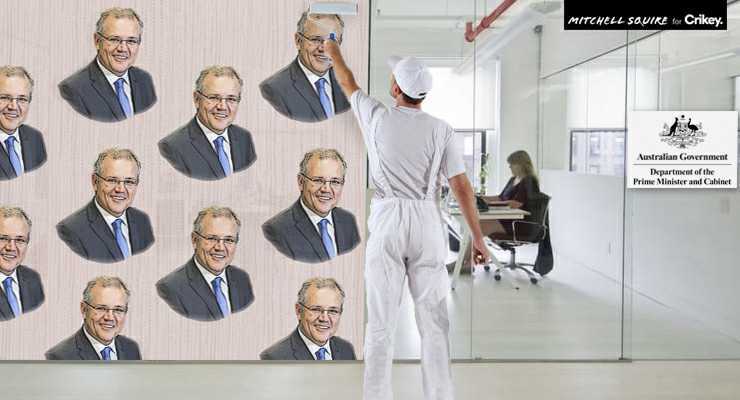
In the Morrison government’s war on accountability, cabinet confidentiality has become a weapon of choice. A once-rare exemption to freedom of information rules, it is now ritually slapped on all matter of requests, stamping out transparency and broadening the blanket of secrecy over government affairs.
Now the exemption has been used to block the release of Phil Gaetjens’ report into the sports rorts scandal. The report was initially buried by Gaetjens, the Department of Prime Minister and Cabinet secretary and Morrison’s former chief of staff, despite a summary finding there were “significant shortcomings” in the way former sports minister Bridget McKenzie decided on the grant.
Media outlets and other parties have since applied for access to the report under FOI laws, but have been rebuffed. They’ve taken their requests to the Office of the Australian Information Commissioner, where the government has argued the report is covered by Cabinet-in-Confidence, and therefore exempt from the FOI Act.
Experts have noted what they believe is a steady rise in the use of the cabinet exemption to avoid the release of information under the Morrison government. The government has used cabinet confidentiality to block FOIs seeking key instructions Morrison issued to ministers, prompting criticism it was using cabinet “as a transparency shield”. It has also applied it to deliberations inside the Australian Health Protection Principal Committee, which is made up of the Commonwealth and state chief medical officers.
The sweeping use of cabinet confidentiality has been used to block the release of potentially damaging reports on government. Last month it was revealed it was being used in the government’s fight to keep hidden documents that a former public servant says could expose what went wrong with Centrelink’s botched robodebt program.
But there is also increasing pushback. Independent Senator Rex Patrick is challenging the idea that cabinet confidentiality should extend to the national cabinet and the now defunct National COVID-19 Commission (NCC) advisory board.
If this legal challenge in the AAT is successful, some of the most sensitive discussions between state and federal leaders in the national cabinet could be laid bare, including discussions on the closure of domestic borders and the Commonwealth’s responsibilities for building quarantine facilities. It could also reveal discussions about preventing and managing aged care outbreaks, including the date on which Aged Care Minister Richard Colbeck first briefed cabinet in relation to COVID-19.
Of course, there are legitimate reasons for some cabinet discussions to remain secret, such as national security issues. But critics say the rise in the use of cabinet exemptions shows just how willing the Morrison government is to hide damaging information that the public deserves to know.
“It’s an absolutely fundamental constitutional principle that the executive is responsible to the Parliament,” Professor Anne Twomey at the University of Sydney said. “We have to be careful to make sure that cabinet confidentiality is not misused so as to undermine that principle.”








Thanks for the article. A pathologically secretive government, led by a compulsive liar. I never used to be a politician basher. I have changed.
If anyone really wants to know the enormity of Morrison’s life of crime here is the link
https://archiearchive.wordpress.com/2013/12/19/the-public-life-of-scott-morrison/
I think a simple solution exists to counter the Federal Coalition from declaring all these documents etc.
not available under freedom of information requests.
Any investigation, that uses public funds should have its findings and recommendation made available to the people who pay for it, that is the people of Australia.
Similarly the rules should be changed to guarantee Public Funding to the Auditor Generals office be exempt from parliamentary reduction. The Auditor Generals Office should be protect by Australian law, against attempts to water down or change its findings by vested interests, such as Federal Government Departments.
I note that none of the findings of investigations, promised by Mr. Morrison, into Sexual wrong doing in Federal Parliament, have been released. Just like the various Rorts instigated by Federal Coalition members of parliament no action will be forthcoming. The people of Australia deserve far better behaviour from their Politicians.
Remember the AAT has been stacked with liberal party cronies. I wonder if they will be any help in throwing any light on these secret discussions.
MSM does nothing serious about the situation therfore I’m assuming their political values are the same as the coalition. Not much hope of change.
Morrison’s Parliamentary Website
Notice how brief his employment has been apart from the Property Council and 4 years with the NSW Lib Party as Managing Director.
And now for the rest of his life he will be living off taxpayers as he has for most of his working life. He left out the stint at KPMG who took pity on him but like the others got rid of him. Of course Morrison being sacked by the NZ and Australian govt for alleged theft and fraud didn’t stop his career, Rodent Howard was very impressed and enabled him to branch stack the seat of Cook after gaining only 8 votes to the branch’s selection who received more than 80 votes.
Such “labour mobility” isn’t necessarily a bd thing, but one does wonder why certain people regularly “achieve” it. I’m reminded of the two graduation ceremonies I attended in the early 90s. The guest speakers were Hilary McPhee, whose address was inspiring and uplifting, and Elizabeth Proust, who at that point seemed to have had more jobs than I’d had hot dinners. I have no recollection of anything Proust said.
two years in a job before moving on to another organisation? That does appear to suggest problems
So he went from getting a BSc to become a National Manager, Policy and Research, Property Council? Are you kidding me, or is that just a grandiose title for an office boy? Alternatively, he has managed to have a career where he is always way out of his depth, which would explain his apparent comfort in that state.